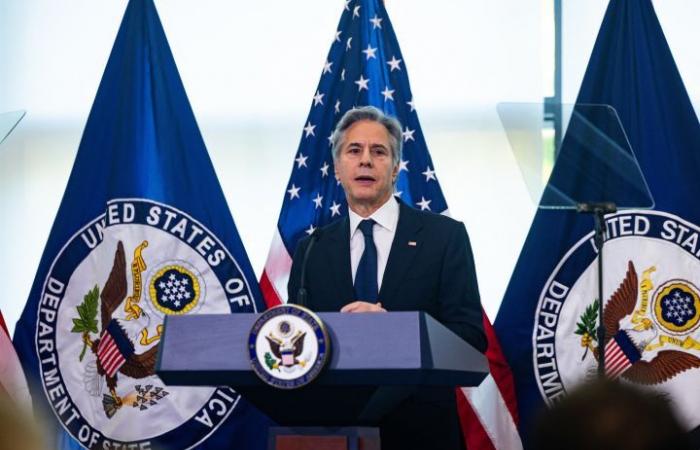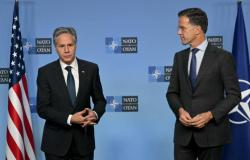The head of American diplomacy Antony Blinken announced Thursday “good progress” in discussions with a view to a possible ceasefire between Israel and Hezbollah in Lebanon.
The United States is working “very hard” to reach an agreement that would include a withdrawal of Hezbollah from the border region with Israel, Mr. Blinken assured during a press conference.
“In view of my recent trip to the region and the discussions held at this very moment, we have made good progress in this direction,” he argued.
“We still have work to do,” he added, calling for “a diplomatic solution, including via a ceasefire.”
Mr. Blinken once again called for the full implementation of United Nations Security Council Resolution 1701, which ended the war between Hezbollah and Israel in 2006 and according to which only the peacekeepers and the Lebanese army must be deployed in southern Lebanon.
Present at his side, the American Minister of Defense, Lloyd Austin, for his part considered that there was an “opportunity” for Lebanon. “We are hopeful that we will see things evolve in Lebanon in the not too distant future.”
Israeli Prime Minister Benjamin Netanyahu met on Thursday with American envoys who came to Israel to move towards a ceasefire in Lebanon, stressing that a truce with Hezbollah must guarantee the security of his country.
This visit to Jerusalem by White House emissaries Amos Hochstein and Brett McGurk aims to end the war.
According to Israeli media citing government sources, the plan drawn up by American mediators provides for a withdrawal of Hezbollah from southern Lebanon, bordering Israel, as well as the withdrawal of the Israeli army from this region, control of which would return to the Lebanese army and UN peacekeepers.
“The main issue (…) is Israel’s ability and determination to enforce the agreement and prevent any threat to its security from Lebanon,” Mr. Netanyahu told the American envoys, according to his office.
Later in the day, the Israeli prime minister claimed that “there is pressure to reach a premature settlement in Lebanon, but reality has proven otherwise.”
“We are changing the face of the Middle East, but we are still in the eye of the storm and we face great challenges. I do not underestimate our enemies at all,” he adds.
He also assured that he “appreciated” American support in the ongoing conflicts, while refusing to give in to pressure from his historic ally.
“I very, very much appreciate American support and my policy is simple: when it is possible, I say yes, but when necessary, I say no,” he said during a military ceremony in southern Israel.
“Terrorist armies will no longer be at our borders. Hamas will no longer control Gaza and Hezbollah will not establish itself on our northern border in positions allowing it to invade (Israel) a few meters from our border,” he said. -he promised.
“We are also blocking arms supply pipes from Iran to Hezbollah, via Syria,” the Prime Minister stressed.
Upon their arrival in Israel, the two White House representatives for the Middle East were received by Israeli Defense Minister Yoav Gallant.
“The discussions focused on strategic challenges and opportunities in the region, namely security arrangements related to the northern area (of Israel) and Lebanon, and efforts to ensure” the release of hostages still held in the Gaza Strip after more than a year of war with Hamas, according to a ministry statement.
A few days before the presidential election in the United States on November 5, the Americans hope to reach a framework agreement in Lebanon, while Israeli leaders want to neutralize Hezbollah in the southern border regions of the country.
According to Israeli channel 12, Israel demands the withdrawal of Hezbollah north of the Litani River, about thirty kilometers north of the Israeli border, the deployment of the Lebanese army on the border, an international mechanism for applying the truce and the guarantee that Israel will retain its freedom of action in the event of threats.
Israeli officials also said that soldiers engaged in a ground offensive in southern Lebanon since September 30 would not withdraw until an agreement that meets Israel’s security requirements.
With AFP






